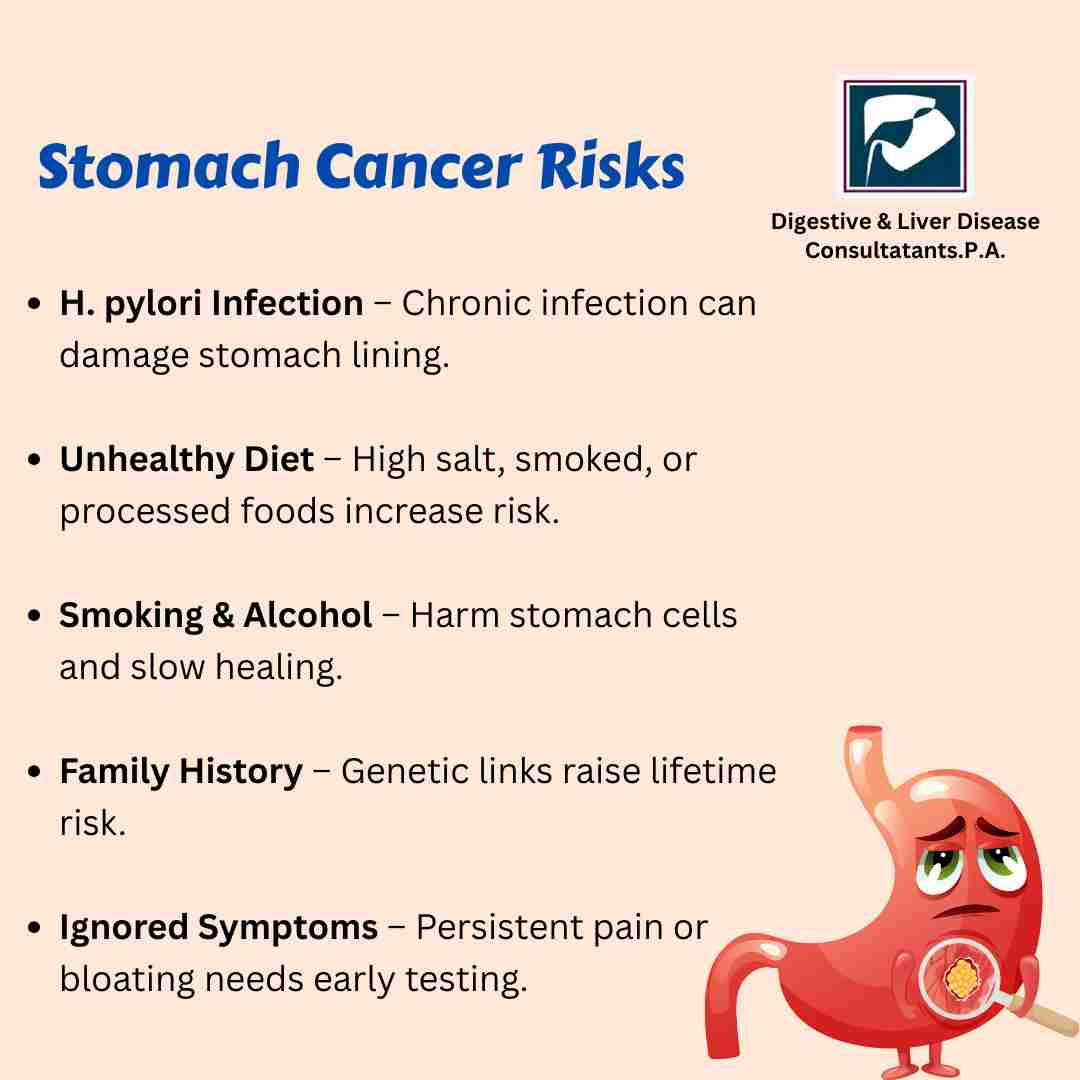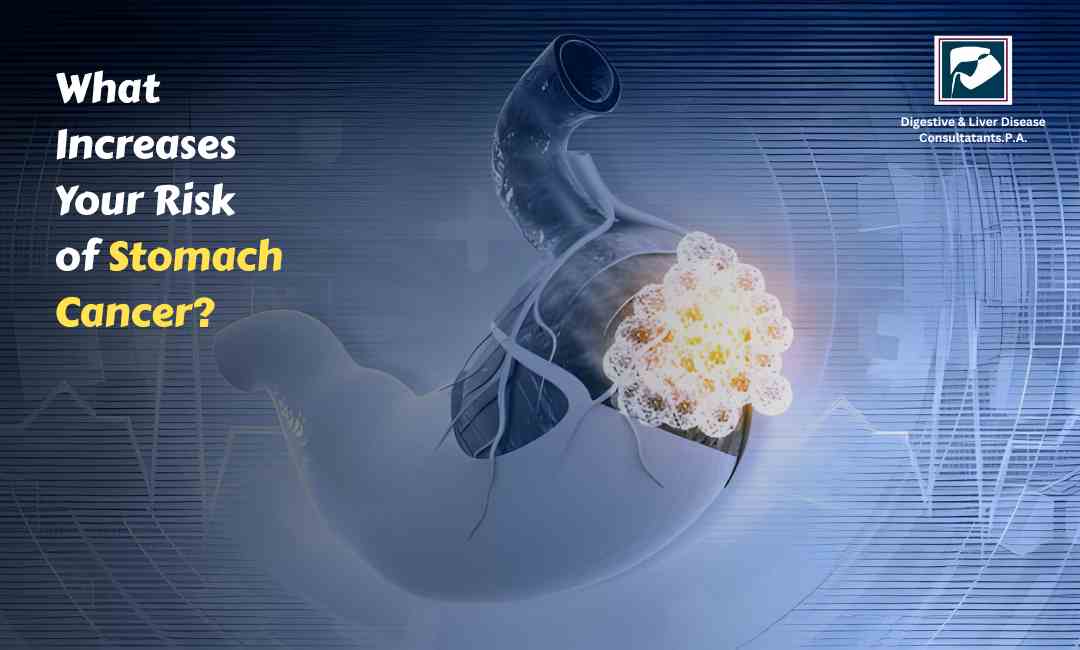Stomach cancer, also known as gastric cancer, develops when abnormal cells grow uncontrollably in the lining of the stomach. While the exact cause of stomach cancer isn’t always clear, several factors can increase your risk over time. Understanding these risk factors can help you take preventive steps and recognize symptoms early, when treatment is most effective.
In this blog, we’ll explore the major causes and risk factors of stomach cancer, along with prevention tips and expert guidance from the Digestive & Liver Disease Consultants, P.A.
What Is Stomach Cancer?
Stomach cancer typically begins in the inner lining of the stomach, known as the mucosa. It can develop slowly over many years, often starting with precancerous changes in the stomach lining. By the time symptoms appear, the disease may have progressed, which is why awareness and early screening are crucial.
Common symptoms include:
- Persistent indigestion or heartburn
- Loss of appetite
- Stomach pain or bloating after eating
- Unexplained weight loss
- Nausea or vomiting
- Blood in the stool or vomit
If you notice these symptoms, especially if they last for more than a few weeks, consult a gastroenterologist for further evaluation.

1. Helicobacter pylori (H. pylori) Infection
A chronic infection with the H. pylori bacteria is one of the leading causes of stomach cancer. This bacteria damages the protective lining of the stomach and triggers long-term inflammation, which can eventually lead to ulcers or cancer.
Prevention tip:
- Get tested and treated for H. pylori infection if you have recurring stomach pain, bloating, or ulcers.
- Avoid excessive use of NSAIDs (like ibuprofen) that can irritate the stomach lining.
2. Diet High in Salt and Processed Foods
A diet that includes too much salt, smoked meats, and pickled foods increases stomach cancer risk. These foods contain compounds that can damage the stomach lining or promote cancer cell growth.
Prevention tip:
- Limit processed meats and salty foods.
- Eat fresh fruits, vegetables, and whole grains rich in antioxidants and fiber.
3. Family History and Genetics
If you have a family history of stomach cancer, your risk is higher. Some genetic conditions, such as hereditary diffuse gastric cancer (HDGC) or Lynch syndrome, can also increase your susceptibility.
Prevention tip:
- Inform your doctor about your family history.
- Genetic counseling and regular screenings may help detect early signs.
4. Smoking and Alcohol Consumption
Smoking doubles the risk of stomach cancer, especially for cancers that develop in the upper part of the stomach. Heavy alcohol use can also damage the stomach lining and increase cancer risk over time.
Prevention tip:
- Quit smoking and avoid excessive drinking.
- Seek help from your healthcare provider for smoking cessation programs if needed.
5. Obesity and Poor Lifestyle Habits
Excess body weight, combined with a sedentary lifestyle, can lead to chronic inflammation and higher stomach acid levels. Both conditions can contribute to stomach cancer development.
Prevention tip:
- Maintain a healthy weight through a balanced diet and regular exercise.
- Manage acid reflux and digestive issues under a doctor’s supervision.
6. Previous Stomach Surgery or Conditions
Individuals who have had stomach surgery, chronic gastritis, or pernicious anemia are more likely to develop stomach cancer later in life. These conditions can change the stomach’s normal structure and acidity, promoting abnormal cell growth.
Prevention tip:
- Schedule regular follow-ups with a gastroenterologist if you’ve had stomach surgery or chronic gastritis.
7. Age and Gender
Stomach cancer is more common in people over 50 and occurs more often in men than women. The risk increases with age due to long-term exposure to environmental and dietary factors.
Prevention tip:
- Adults over 50 with chronic digestive issues should consider periodic endoscopic screening.
8. Occupational Exposure
Exposure to certain chemicals, such as asbestos, coal dust, or rubber manufacturing fumes, has been linked to an increased risk of stomach cancer.
Prevention tip:
- Use protective equipment if you work in industrial settings.
- Follow safety regulations and undergo regular health checks.
9. Low Intake of Fruits and Vegetables
A diet lacking in fresh fruits and vegetables means fewer antioxidants to protect your stomach lining from damage. Vitamins C and E, as well as carotenoids, play an important role in reducing inflammation and cancer risk.
Prevention tip:
- Eat a variety of colorful fruits and vegetables daily.
- Include citrus fruits, tomatoes, leafy greens, and berries in your diet.
10. Certain Medical Conditions
Some medical issues, like acid reflux disease, Barrett’s esophagus, or intestinal metaplasia, can increase the risk of developing stomach cancer if left untreated.
Prevention tip:
- Manage chronic acid reflux with medical care.
- Follow your doctor’s recommendations for periodic monitoring.
How to Lower Your Risk of Stomach Cancer?
While some risk factors like age or genetics can’t be changed, you can reduce your risk through healthy lifestyle choices:
- Eat a diet rich in fiber, fruits, and vegetables.
- Limit salt, processed meats, and smoked foods.
- Avoid smoking and excessive alcohol consumption.
- Stay physically active and maintain a healthy weight.
- Get tested for H. pylori and seek treatment if positive.
See a gastroenterologist for regular check-ups if you have a family history or ongoing digestive problems.
About Digestive & Liver Disease Consultants, P.A.
At Digestive & Liver Disease Consultants, P.A., our best gastroenterologists in Houston, Texas, provide advanced diagnostic and treatment services for all types of digestive and liver conditions. We specialize in early detection and prevention of gastrointestinal cancers, including stomach, colon, and liver cancer.
Our team focuses on accurate diagnosis, compassionate care, and personalized treatment plans to help patients maintain optimal digestive health.
Conclusion
Stomach cancer develops over time, and understanding your risk factors can make a major difference in early detection and prevention. If you have frequent indigestion, bloating, or unexplained weight loss, don’t ignore these signs.
Schedule an appointment with Digestive & Liver Disease Consultants, P.A. to discuss your symptoms, get screened, and take proactive steps toward better digestive health.






